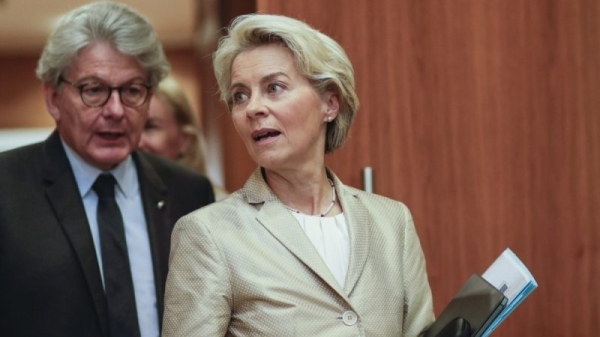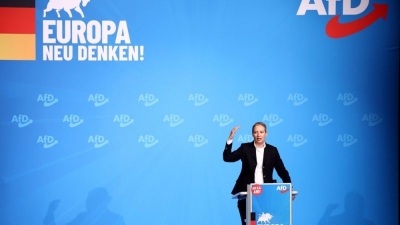EU Commission tables ambitious defence single market programme, but with modest funds

The European Commission tabled a modest fund on Tuesday (5 March) to start up its first defence production programme and strategy, to increase industrial output, give the sector more visibility, and prepare for potential shortages in crisis times.
The EU executive proposed a defence industry support programme under the name of the European Defence Investment Programme (EDIP), with a €1.5 billion financial envelope within the next EU seven-year budget for 2028-2035.
As previously reported by Euractiv, the scheme is largely based on the idea of the US Production Act and to create an EU defence single market.
The programme and the over-arching European Defence Industrial Strategy (EDIS) tabled by the Commission show the will re-industrialise Europe’s military-industrial complex, after decades of under-investment following the end of the Cold War.
“After decades of underspending, we must invest more on defence, but we need to do it better and together,” the EU’s chief diplomat Josep Borrell told reporters in Brussels.
“A strong, resilient, and competitive European defence industry is a strategic imperative,” he added.
Key measures involve VAT exemptions, grants, and loans to help match supply and demand across the bloc and change the market’s organisation by motivating more cooperation between the member states.
Funds are therefore meant to motivate joint procurement, build stockpiles, and ready-for-use production lines, re-purpose orders for the defence market, map bottlenecks, and product catalogues, and include Ukraine on almost the same basis as EU countries.
The programme also gives the EU’s executive the possibility to organise the purchase of equipment on behalf of the member states in a move to reduce investment risk for factories.
Since Russia’s war in Ukraine started two years ago, the industry has been asked to increase output but has argued against investing in new production lines without contracts from the governments or long-term visibility.
“Increasing the defence base is an existential objective,” Internal Market Commissioner Thierry Breton told reporters in Brussels.
The modest budget is meant to avoid what Commission officials call a “defence shutdown” before the next EU multi-annual budget, since the earlier defence industry programmes for joint procurement and ammunition production end in 2025.
Leaders from Estonia, France, and Poland, as well as the Netherlands, are already asking for a large budget to respond to the re-industrialisation needs of the continent, an issue the new strategy and regulation aims to resolve.
“It is not a lot of money, but it can work as an incentive, a bonus, to come together – the real funding comes from the member states,” Commission Vice-President Margrethe Vestager said.
“Here we can enable for the funding to be used in a better way, to get more value for money, and so it’s spent in Europe… With war on our borders, if not now, when?”
One goal of the strategy is to invert the trend of the past two years of the EU countries spending 70% of their money on defence equipment made outside the bloc and to spend at least 50% of their cash on EU-made products by 2030.
“The availability of European defence equipment is now becoming a competitiveness and security issue for the European defence industry,” Breton told reporters.
“This means that the European defence industry must take more risks, and we will support them to give them greater visibility,” he added.
Long-term funding unclear
With the new piece of legislation, the European Commission wants to plan for the long term and envisage new funding opportunities.
Breton said the bloc needed €100 billion to bring the industry production capacity to war-time pace and match the needs of EU countries and Ukraine.
The new strategy is adding pressure on the European Investment Bank (EIB) to review its lending policy and it also proposed that member states channel their cohesion funds towards defence factories.
Breton told a small group of reporters he’s in favour of using the extraordinary revenues from immobilised Russian frozen assets to boost Europe’s and Ukraine’s military-industrial base.
According to him, Europeans should consider an ad-hoc joint investment for the defence industry, alike the €800 billion fund for post-pandemic recovery funded with loans.
Belgium, France, and Estonia supported the idea of the European Commission again issuing bonds to increase funding for the industry.
Bringing more realism to the table, one Commission official cautioned that “the strategy reflected that in no way do we believe this will solve all the capability gaps and requirements out there”.
Difficult negotiations ahead
The EU executive’s proposal will now be sent to the member states and the European Parliament for negotiations and amendment, where discussions are set to be difficult.
Commission officials, aware of potential sensitivities with national governments, refuse to be accused of a “power grab” where the EU executive encroaches on member states’ prerogatives.
“This is not true,” Breton said, adding the proposal is in line with the EU treaties and will not replace the governments.
The text also features ideas that were rejected by member states in the framework of the ammunition production boosting scheme (ASAP), including the option to re-purpose production lines in case of crises, with fines on the non-compliant industry.
Member states have also been asking repeatedly for an impact assessment to be drafted, to give them an overview and justification for the regulation and the Commission’s promise that it is the best way to increase the bloc’s defence production capacity, given most of the data is sensitive and confidential.
Other questions are set to arise around the European buying preference and the issue of how Ukraine should benefit from the programme and funds while it is not paying in for it and does not abide by the same norms as the bloc’s industry.
Read more with Euractiv




